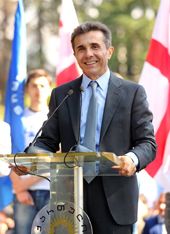Georgia awaits co-investors
Monday, October 14

Billionaire Ivanishvili promised to establish a fund for encouragement of business and implementation of major projects in his election campaign in 2012. However, settlement of technical and legal issues lingered on. This is the main difference between the new Georgian authorities and the quick temper of Saakashvili’s team: the former leaders dealt with such problems without giving them a second thought, ignoring detailed preparations for such important decisions. Sometimes they succeeded, but in other cases they made a lot of mistakes. The new leader of the country acts in a different way: the preparation took a year, but financing and partners of the fund, as well as priority projects are clear.
Partners of the Fund of Co-Investing are Kazakh billionaire and old business partner of Premier, Alexander Mashkevich, SOFAR, successors of late billionaire Badri Patarkatsishvili, Dhabi Group, Milestone International Holdings Group Limited, and some other companies registered in off-shores. Officially he invested into the Fund of Co-Investing $1 billion. But he has many times stated that he is ready to spend up to 90% of its capital ($5.3 billion) on development of the country.
During the presentation Premier stressed that the Fund “won’t deal with charity and social projects, but is going to finance only profitable projects.” Anyway this is “the cheapest and longest money” which is a dream of any developing country. Projects will come, if money exists. Any Georgia or foreign businessman can come to the Fund, present a project worth at least $5 million and receive re-financing up to 75%.
At the same time, some experts find the principle of co-financing ambiguous. For example, prominent businessman Kakha Bendukidze told Vestnik Kavkaza that he didn’t believe in ability of the Fund to attract significant investments. “The principle of co-financing won’t be effective in Georgia,” Bendukidze noted, stressing that he had no intention of participating in the project.
At the same time, he sees Ivanishvili’s ideas negatively due to values and world outlook: as the majority of libertarians, Bendukidze thinks that a person “should be given a rod, not fish,” while multimillion investments will only corrupt the business community of the country instead of encouraging its creativity.
Anyway nobody refuses the money, and Ivanishvili’s Fund can be a salvation for the Georgian economy which suffers from the lack of investments.
The only project of the Fund which can be called ambiguous is construction of a new deep-sea port near the village of Anaklia. Ivanishvili states that capacity of the fourth Georgian port (along with Poti, Batumi and Kulevi) will be 110 million tons, while the cargo turnover of the three other ports together is less than 10 million tons annually.
Georgy Kalatozishvili, Tbilisi. Exclusively to Vestnik Kavkaza, Oct 4, 2013
